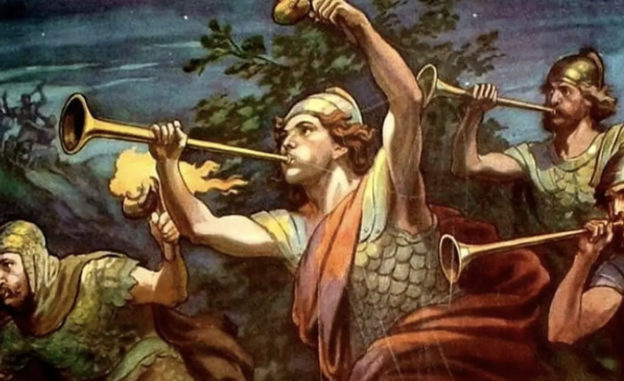Our world too often operates on the “might makes right” basis, whether it is through control of the levers of power, or invading other countries who have something you would like. Weakness is not a virtue, or a place from which victory is expected. Those that win through strength of body, supporters, or numbers, live in boastful pride that none can stop them.
But this position is not true. God humbles the proud, and lays low the wicked. Sometimes he uses great numbers, and sometimes the weak and humble to demonstrate his own power and leave no room for boasting. The victory of Gideon over Midian would be a demonstration of God giving strength through earthly weakness.
After receiving the assurance he sought from God, Gideon and those who answered his call arose and encamped beside a spring, with the Midianite horde gathered to the north (v.1).
Gideon and his force numbered 32,000 men, a formidable group to wage war against the enemies of God’s People. But that number was too many for God “to give the Midianites into their hand” in case they proudly thought that they had won the battle, not God (v.2).
So God commanded Gideon to order the fearful to return home (v.3). This order was from the Law, which in Deuteronomy 20:8 instructs that the fearful and fainthearted should be dismissed from battle, in case they affect morale and cause a dangerous and disordered retreat in battle.
The effect of this order was to send away 22,000 fearful men, leaving 10,000 (v.3). A considerably smaller force, which would face a significant disadvantage in battle. But still too many for God.
The next step Gideon was to take to refine his army was to “take them down to the water, and I will test them for you there” (v.4). There, Gideon was to split into two groups those who drank by kneeling, and those who lapped the water with their tongues (v.5).
While it might be tempting to place some military superiority in one group over another, the reality is the distinction was arbitrary and only to allow God to further weaken the Israelite force, in case they had any reason for pride in their fighting abilities.
Those who lapped the water were 300, while the remaining knelt to drink (v.6). With these God would defeat Midian. “With the 300 men who lapped I will save you and give the Midianites into your hand, and let all the others go every man to his home” (v.7).
Gideon had his army of 300, to fight the countless thousands of Midianites. An unfair fight, because despite their few numbers, God was on Israel’s side.
God made this even clearer to Gideon by a very unusual means. God instructed Gideon to go down into the Midianite camp, and if he was afraid given his past acts and the extreme odds, to sneak in at night and hear what the Midianites were saying to each other (vv.9-10). By doing this, Gideon would “be strengthened to go down against the camp” (v.11).
Gideon went down to the giant camp, which was full of Midianites and allies like a swarm of locusts (v.12), and heard what must have been the most unexpected words to come from the mouth of your enemy!
Listening to the campfire chat, Gideon heard one Midianite soldier describe a dream where a loaf of bread knocked over a Midianite tent (v.13).
What was the interpretation of this dream? “His comrade answered, “This is no other than the sword of Gideon the son of Joash, a man of Israel; God has given into his hand Midian and all the camp” (v.14).
Imagine hearing that! Your own enemies are casually prophesying their doom. Only God could lie behind that message.
This was a message Gideon could not ignore. After flaming pyres and fleeces, an absurdly small force and an absurdly large prophecy of doom, Gideon knew that God would deliver Israel through his hand. He worshipped God, and raced back to the Israelite camp to tell them the good news (v.15). Despite their weakness, they were strong, because God had given them strength.
God wins through the humble and earthly weak today. God uses many humble folk to witness to him, to quietly work, and advance God’s kingdom despite the earthly desire for charismatic people.
God could use you to humbly and simply stand for him, in the place he has called you to. You do not need to be quick on your feet or “strong”, because God will give you strength.
After all, what was Christ if not the meekest and lowly, born in a manger, in a backwater of the Roman Empire. Yet this humble man of humble origins was God’s Son, sent to save us from our sins. Outwardly weak. But the demonstration of God’s strength, defeating the powers of sin and death that we could not conquer, lest we should boast in our own strength instead of God.


